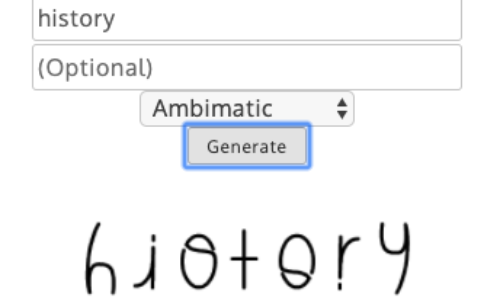An ambigram is a word or combination of words that can be read in more than one direction. There are many types of ambigrams, with the most popular types being rotational ambigrams, and mirror ambigrams. Coincidentally, these are also the types that can be made with an online ambigram generator. (For a complete list of types, see Wikipedia.)
Ambigram Generator types
Currently there are three types of ambigram generator, two for rotational ambigrams and one for mirror ambigrams.
Ambimatic type ambigram generators
We will call the first and oldest type of ambigram generators, ambimatic type generators. These generators are a sort of brute force approach to making ambigrams. Here you ‘simply’ make an ambigram for each letter combination in the alphabet. I say simply, but that means 26×26=676 ambigram glyphs! All of which need to have a similar style on top of that. The only plus is that someone trying to make such a font only has to make half of the letters, as the other half is the flipped version of a letter that is already created. E.g. ‘ga’ is the inverse of ‘ag’.
Because these generators can only map one letter to one letter, the resulting ambigram will have a limited complexity. In theory, it is possible to add combined letters to this type of generator. E.g. ‘m’ flips to ‘ui’, but the amount of ambigram glyphs would very quickly grow to crazy amounts. One collection of such ambigrams is called an ambigram font. It should however not be confused with a computer font, as it would never be possible to map a full ambigram font to a single keyboard.
Ambimatic type generators are currently the most popular type of generator, mostly because they are one of the simplest generators to make. On our website, we currently host over five unique ambigram fonts of the rotational type.
These type of fonts are said to be good for ambigram tattoo designs.
Flipscript type ambigram generators
The second type of ambigram generator is much more advanced than the ambimatic type. This type of generator is currently only used by the flipscript website and its exact algorithm is a closely guarded secret.
However, the basic structure of this algorithm can be easily inferred from the output. Instead of making individual letter combinations, flipscript makes smaller parts called ambigram curves. Once you have enough curves, you can mix and match them to create letter pairs for almost any letter combination. Imagine that you have three curves that have the shape of ‘L’, ‘I’ and ‘i’. These can be combined into ‘ui’ and upside down become ‘m’, hence solving what ambimatic type ambigram generators cannot.
A generator like this will work with about 20-30 well picked curves, but if you want flipscript type quality you will need many more curves. It is said that their database contains over 5 million curves. Needless to say, nobody managed to create a second flip script type generator to date.
Mirroring ambigram generators
The third type of ambigram generator is the mirroring type. Compared to the other two, these are about as complex as ambimatic type generators or simpler. The simplest is the lake reflection font, where each letter is a reflected horizontally, like it is half submerged in a lake. This font only needs 26 letters, as the letters simply reflect themselves. Our generator has a simplified version of such a font by Daan Jutteman, but a fully interactive version can be found on fontmeme.
Wall or vertical reflected ambigrams would work in the same way as an ambimatic type generator. This type does not exist yet though. Although we are working on one.
Ambigram generator History
Ambigram generators are around for about a quarter century now, with the very first being brought online by David Holst in 1996. He called this generator the ambigrammatic or abimatic. The ambigram glyphs were made in a program called FutureSplash Animator, a primitive Adobe Illustrator like program that allowed users to draw auto-curves.
The ambimatic stayed online until 2011, after which the domain started pointing to flipscript. After that the ambimatic font became unavailable for use until it was brought back and was redrawn for our website. There are some unsanctioned mobile apps that use this font, but since they are not on the official app store, we advise against using them.
The ambimatic stayed uncontested for a few years until in 2005 flipscript launched their website and generator. Their main font ‘fyrewater’ was designed by Daniel Dostal and John Langdon, and is claimed to be the world’s most advanced ambigram font. It is a very calligraphic font with many swirls and curls. Their other font is called ‘Wyndestorm’, created by Daniel and Nikita Prohorov is a much less swirly and has a more ‘sans-serif’ design.
Somewhere around 2008 Jean-Paul Davalan launched his own ambigram generator on his website. This was an ambimatic type generator. In 2020 makeambigrams came online. This website brought back and remade several old fonts and converted several existing fonts to work with our generator. The Ambint font was specifically commissioned for this site from Manoj Mhapankar
To our knowledge no other generators have been made, apart from websites and apps that stole existing fonts.

